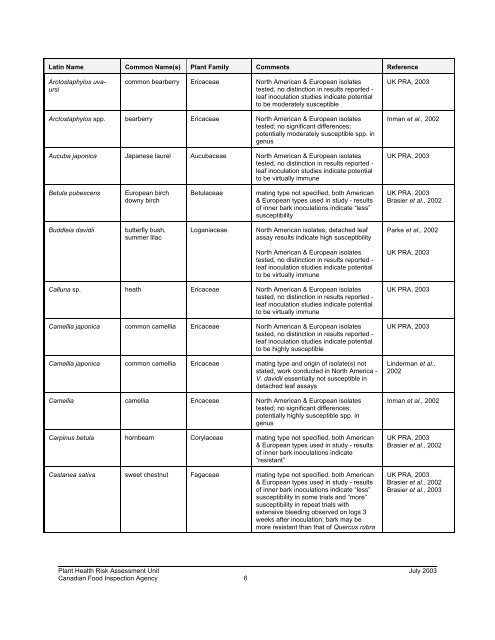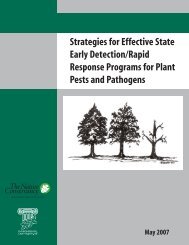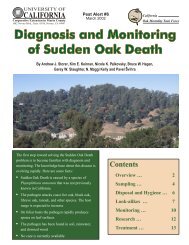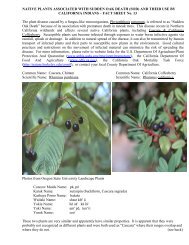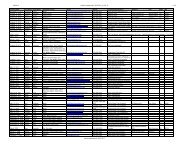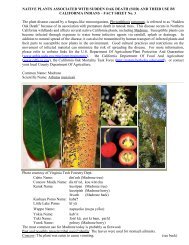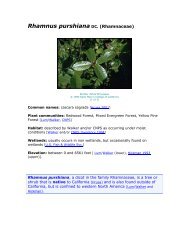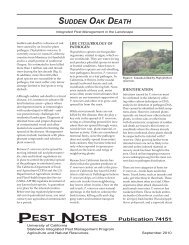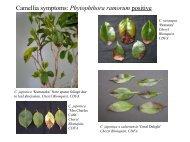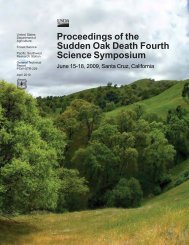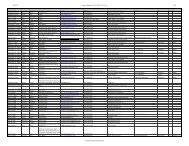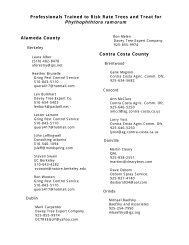Hosts of Phytophthora ramorum, CFIA, July, 2003 - Sudden Oak Death
Hosts of Phytophthora ramorum, CFIA, July, 2003 - Sudden Oak Death
Hosts of Phytophthora ramorum, CFIA, July, 2003 - Sudden Oak Death
You also want an ePaper? Increase the reach of your titles
YUMPU automatically turns print PDFs into web optimized ePapers that Google loves.
Latin Name Common Name(s) Plant Family Comments Reference<br />
Arctostaphylos uvaursi<br />
common bearberry Ericaceae North American & European isolates<br />
tested, no distinction in results reported -<br />
leaf inoculation studies indicate potential<br />
to be moderately susceptible<br />
UK PRA, <strong>2003</strong><br />
Arctostaphylos spp. bearberry Ericaceae North American & European isolates<br />
tested; no significant differences;<br />
potentially moderately susceptible spp. in<br />
genus<br />
Aucuba japonica Japanese laurel Aucubaceae North American & European isolates<br />
tested, no distinction in results reported -<br />
leaf inoculation studies indicate potential<br />
to be virtually immune<br />
Inman et al., 2002<br />
UK PRA, <strong>2003</strong><br />
Betula pubescens<br />
European birch<br />
downy birch<br />
Betulaceae<br />
mating type not specified, both American<br />
& European types used in study - results<br />
<strong>of</strong> inner bark inoculations indicate “less”<br />
susceptibility<br />
UK PRA, <strong>2003</strong><br />
Brasier et al., 2002<br />
Buddleia davidii<br />
butterfly bush,<br />
summer lilac<br />
Loganiaceae<br />
North American isolates, detached leaf<br />
assay results indicate high susceptibility<br />
Parke et al., 2002<br />
North American & European isolates<br />
tested, no distinction in results reported -<br />
leaf inoculation studies indicate potential<br />
to be virtually immune<br />
UK PRA, <strong>2003</strong><br />
Calluna sp. heath Ericaceae North American & European isolates<br />
tested, no distinction in results reported -<br />
leaf inoculation studies indicate potential<br />
to be virtually immune<br />
Camellia japonica common camellia Ericaceae North American & European isolates<br />
tested, no distinction in results reported -<br />
leaf inoculation studies indicate potential<br />
to be highly susceptible<br />
Camellia japonica common camellia Ericaceae mating type and origin <strong>of</strong> isolate(s) not<br />
stated, work conducted in North America -<br />
V. davidii essentially not susceptible in<br />
detached leaf assays<br />
Camellia camellia Ericaceae North American & European isolates<br />
tested; no significant differences;<br />
potentially highly susceptible spp. in<br />
genus<br />
Carpinus betula hornbeam Corylaceae mating type not specified, both American<br />
& European types used in study - results<br />
<strong>of</strong> inner bark inoculations indicate<br />
“resistant”<br />
Castanea sativa sweet chestnut Fagaceae mating type not specified, both American<br />
& European types used in study - results<br />
<strong>of</strong> inner bark inoculations indicate “less”<br />
susceptibility in some trials and “more”<br />
susceptibility in repeat trials with<br />
extensive bleeding observed on logs 3<br />
weeks after inoculation; bark may be<br />
more resistant than that <strong>of</strong> Quercus rubra<br />
UK PRA, <strong>2003</strong><br />
UK PRA, <strong>2003</strong><br />
Linderman et al.,<br />
2002<br />
Inman et al., 2002<br />
UK PRA, <strong>2003</strong><br />
Brasier et al., 2002<br />
UK PRA, <strong>2003</strong><br />
Brasier et al., 2002<br />
Brasier et al., <strong>2003</strong><br />
Plant Health Risk Assessment Unit <strong>July</strong> <strong>2003</strong><br />
Canadian Food Inspection Agency 6


